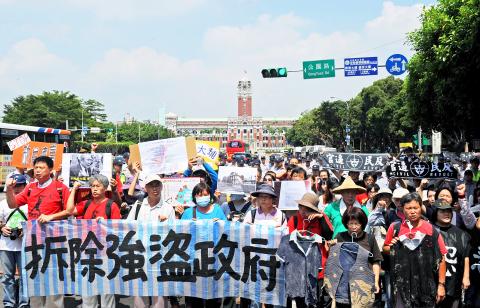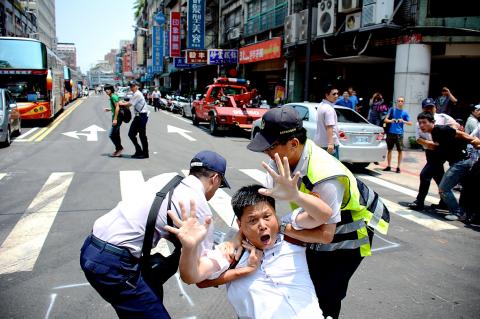Renewed clashes broke out yesterday as self-help organizations against the forced house demolitions in Miaoli County’s Dapu Borough (大埔) protested outside the new Ministry of Health and Welfare in Taipei during a visit by President Ma Ying-jeou (馬英九), leading to the arrest of a National Chengchi University professor and another demonstrator.
Four houses in Dapu were demolished by the Miaoli County Government on Thursday last week to make way for a science park project, despite the protests of students, academics and civic group activists questioning the legitimacy of the local government’s actions.
More than 100 people demonstrated in front of the Presidential Office, urging the government to apologize and return the land to its owners before Aug. 18, which would mark the one-month anniversary of the houses being torn down.

Photo: CNA
Taiwan Rural Front spokeswoman Frida Tsai (蔡培慧) said the central government had connived with the county government, and their brutal actions not only demolished the houses, but also the public’s last bit of faith in the government system.
The groups said the county government even asked one of the homeowners to pay a disposal fee of about NT$242,000 — approximately the same amount as the owner received in compensation for the land expropriation.
They said the request laid bare the “brutal and intentional bullying” nature of the Miaoli County Government.

Photo: J. Michael Cole, Taipei Times
Peng Hsiu-chun (彭秀春), one of the four homeowners, held up objects salvaged from the rubble of her home.
“I don’t want to stand against the government. I only want a home — a home that I worked hard for. I paid my taxes, but my home is gone now,” a sobbing Peng said.
Tsai said if the government does not apologize to the people, return their land, investigate possible corruption surrounding the project and immediately amend the Land Expropriation Act (土地徵收條例) to protect the public’s rights, they will call for more people to “dismantle the bandit government.”
Several of the demonstrators later went to Tacheng Street, where Ma was attending the opening ceremony for the new ministry.
“[You] knock down houses in Dapu today; [we] tear down the government tomorrow,” National Chengchi University professor Hsu Shih-jung (徐世榮) sang as black official state cars drove by the crowd on the sidewalk.
Hsu, who was shouting the slogan adopted by the protesters, was immediately pulled away by police officers, who said he had violated the Public Safety Act (公共危險罪).
Although he repeatedly said that he had not broken the law, Hsu was dragged to a police car and taken to a police station by several officers.
As he was taken away, other protesters surrounded the police and shouted “use of excessive force.”
Hung Chung-yen (洪崇晏), a student from National Taiwan University, was also taken away by police for alleged violations of the act and malfeasance after he fell to the ground and injured his head during clashes with police.

The CIA has a message for Chinese government officials worried about their place in Chinese President Xi Jinping’s (習近平) government: Come work with us. The agency released two Mandarin-language videos on social media on Thursday inviting disgruntled officials to contact the CIA. The recruitment videos posted on YouTube and X racked up more than 5 million views combined in their first day. The outreach comes as CIA Director John Ratcliffe has vowed to boost the agency’s use of intelligence from human sources and its focus on China, which has recently targeted US officials with its own espionage operations. The videos are “aimed at

STEADFAST FRIEND: The bills encourage increased Taiwan-US engagement and address China’s distortion of UN Resolution 2758 to isolate Taiwan internationally The Presidential Office yesterday thanked the US House of Representatives for unanimously passing two Taiwan-related bills highlighting its solid support for Taiwan’s democracy and global participation, and for deepening bilateral relations. One of the bills, the Taiwan Assurance Implementation Act, requires the US Department of State to periodically review its guidelines for engagement with Taiwan, and report to the US Congress on the guidelines and plans to lift self-imposed limitations on US-Taiwan engagement. The other bill is the Taiwan International Solidarity Act, which clarifies that UN Resolution 2758 does not address the issue of the representation of Taiwan or its people in

US Indo-Pacific Commander Admiral Samuel Paparo on Friday expressed concern over the rate at which China is diversifying its military exercises, the Financial Times (FT) reported on Saturday. “The rates of change on the depth and breadth of their exercises is the one non-linear effect that I’ve seen in the last year that wakes me up at night or keeps me up at night,” Paparo was quoted by FT as saying while attending the annual Sedona Forum at the McCain Institute in Arizona. Paparo also expressed concern over the speed with which China was expanding its military. While the US

SHIFT: Taiwan’s better-than-expected first-quarter GDP and signs of weakness in the US have driven global capital back to emerging markets, the central bank head said The central bank yesterday blamed market speculation for the steep rise in the local currency, and urged exporters and financial institutions to stay calm and stop panic sell-offs to avoid hurting their own profitability. The nation’s top monetary policymaker said that it would step in, if necessary, to maintain order and stability in the foreign exchange market. The remarks came as the NT dollar yesterday closed up NT$0.919 to NT$30.145 against the US dollar in Taipei trading, after rising as high as NT$29.59 in intraday trading. The local currency has surged 5.85 percent against the greenback over the past two sessions, central